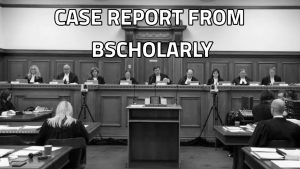Facts, Issues & Judgment of Court in Amaechi v INEC (Independent National Electoral Commission): In a democratic setting, most government officials are chosen by the people through a process called voting. This is the usual process by which officials of the executive and legislative arms are brought into office, as created by, and for the period prescribed by the Constitution of the Country. This prescribed period is called the tenure of office and it is the period of incumbency.
As is normal of almost every area of life and procedure that has human involvement, there is a law guiding the process of voting. The elections are regulated by the Electoral Act 2010 (as amended). Before this time, there were other Electoral Acts like the Electoral Act of 2006.
The law also guides the institution of processes where a candidate or a political party is aggrieved by the outcome of an election. This includes where there is a need to challenge the validity of an election just conducted; where there is dispute as to the return of a candidate and where there is a claim of the return of a candidate. All of the above are done by petition.
The elections are also regulated by the provisions of the Constitution, as the grundnorm.
Election petitions have been described as sui generis. The proceedings are special, peculiar and different from the regular mode of civil proceedings. Time is of the essence in an election petition and an irregularity is not regarded as a mere technicality.
Thus, a party who does not agree with the outcome of an election based on how it was conducted or the qualification of the candidate who won the election, seeks remedy by filing an election petition in the court which has jurisdiction to hear it. For the members of the legislature, it is the National and State Houses of Assembly Election Tribunal. For the Governorship candidates, it is the Governorship Election Tribunal. For the President and Vice President, it is the Court of Appeal. These are provided in Section 285(1)(2)(7).
In the case Amaechi v INEC, the court had to determine the eligibility of a candidate as the plaintiff/respondent was aggrieved by the outcome of the election.

Recommended: Advantages and Disadvantages of Alternative Dispute Resolution (ADR)
Facts of Rotimi Chibuike Amaechi v Independent National Electoral Commission (INEC)
In 2007, Chibuike Amaechi contested the Primaries in a political party called People’s Democratic Party, against seven other members of the party. This was to become the PDP Governorship candidate for the Governorship election. He won 6527 votes out of 6575 votes and emerged the winner.
His name was submitted to INEC by PDP as the PDP Governorship candidate, but was later substituted with that of Celestine Omehia. This was without any court order to that effect.
Chibuike Amaechi, the Plaintiff/appellant then sued the Independent National Electoral Commission in the Federal High Court, then later sought leave and was granted leave to join Celestine Omehia and the People’s Democratic Party (PDP) as 2nd and 3rd defendants, who are 2nd and 3rd respondents in the Supreme Court, respectively.
Summarily, the appellant claimed as follows:
1. That a declaration be made that neither a political party nor the Independent National Electoral Commission could substitute a candidate’s name for another under the Electoral Act, without a court order first made, disqualifying the candidate whose name had already been submitted.
2. That a declaration be made that INEC had no power to screen, verify and disqualify a candidate already screened by his political party.
3. That a declaration be made that it is only the court that can disqualify a candidate whose name has already been published under Section 32(2)(5) of the Electoral Act.
4. A declaration that the 1st respondent had no cogent reason to substitute the appellant’s name with that of the 2nd respondent.
5. A declaration that the actions of the 1st and 3rd respondent was illegal and unlawful.
6. An order of perpetual injunction restraining the respondents from substituting the appellant’s name with that of the 2nd respondent without a court order disqualifying the appellant or a cogent reason given by the 3rd respondent.
Also see: Differences between a deed and an agreement
The 1st respondent, in its statement of defense stated that it had a right to change or substitute their candidates 50 days before the election and that the substitution was done within that allowed timeframe.
Omehia’s defense was that the appellant’s name was erroneously sent to the 1st respondent. He argued that this error was then corrected by the substitution that was made.

Recommended: Facts, Issues and Judgment in Mojekwu v Mojekwu
Issues determined in Amaechi v INEC
a. Whether there was a cogent reason for the substitution made, of the appellant’s name.
b. Whether the substitution is invalid, if found that there was no cogent reason to make the substitution.
c. Whether the appellant ought to be declared winner of the Governorship election, since at the time of the election, the appellant was the only candidate the People’s Democratic Party had.
Also see: How to become a successful lawyer
Decision of the court in Rotimi Chibuike Amaechi v Independent National Electoral Commission (INEC)
The Supreme Court found in favour of the appellant.
The Court held that the political party did not give sufficient reason for substituting the appellant’s name for that of Celestine Omehia. The reason did not meet the requirements as provided under Section 34 of the Electoral Act.
Chibuike Amaechi, never being removed as the candidate chosen by the People’s Democratic Party in the Primaries; having had his name sent to the Independent National Electoral Commission (INEC); and the Independent National Electoral Commission, having never given a cogent reason for substituting his name for that of Omehia’s, was still the candidate of the political party at the time of the election. The substitution was merely a purported attempt to change the candidate which had had victory, and which attempt, was not valid.
Thus, the substituted candidate’s victory in the election was irrelevant as his participation in the election was improper. Thus, the party properly nominated will step into the shoes of the party improperly nominated whether such a party has won the election or lost it.
The court held that since the party was not adequately removed, the campaign for votes done by the party was done in favour of the appellant and he was also the winner of the election, since PDP had won the election. He was, thus, the Governor of Rivers State by virtue of the political party winning the election.

Oguntade JSC stated that it was surprising that the Independent National Electoral Commission would plead the indictment of the plaintiff, which was done after the substitution was made, as a reason for its action of substituting his name for that of Omehia.
Oguntade stated that the provisions of Section 308 of the 1999 Constitution of the Federal Republic of Nigeria (as amended) cannot be used as a shield by INEC as it can’t be used to perpetuate injustice. The immunity provision cannot operate where the instant question bordered on the eligibility of the purported winning candidate for the political office.
Where the Constitution has already made provisions as to tenure, it could not be said that the appellant should be made to wait till the purported winning candidate completes the prescribed tenure in office, before the appellant can exercise his right of action. Allowing such would be destroying the res of the action and forever depriving him of his Constitutional rights to challenge the validity of INEC’s substitution.
The attitude of the court in this case was to do justice at all cost. According to Oguntade, he would do justice even if the heavens would fall, but then stated that he was confident that it was when he did justice that they heavens will stay in place.
He stated that when a candidate is fronted for election, the reputation of such candidate, good or bad, has a bearing on whether or not the party will win. However, at the end of the day, it is the party that wins.
Also see: Historical development of the Constitution of Nigeria
The Court stated that as a creation of the Constitution, political parties have a role to play in upholding the rule of law, but that that was not done by the People’s Democratic Party in the instant case. But even worse, a case of disregarding the rule of law, was that of the Independent National Electoral Commission and the Second respondent, Omehia.
These sought the aid of Section 308 of the 1999 Constitution of the Federal Republic of Nigeria (as amended) to perpetuate the injustice that had already been done to the appellant and deprive him of his right to a redress for the injustice. The plea to allow the provisions of the above section operation was baseless as the claim of the appellant of the injustice that had been done to him was a pre-election matter, not an issue that came into existence after the election had been done and won.
Thus, the participation of the Second respondent in the election was an illegal act, and he could not be heard to claim benefits for his illegality.
The court stated that the appellants’ could not be expected to seek for a re-election and invalidate the election which involved other political parties, for an issue that involved a dispute within a political party.

Edeh Samuel Chukwuemeka, ACMC, is a lawyer and a certified mediator/conciliator in Nigeria. He is also a developer with knowledge in various programming languages. Samuel is determined to leverage his skills in technology, SEO, and legal practice to revolutionize the legal profession worldwide by creating web and mobile applications that simplify legal research. Sam is also passionate about educating and providing valuable information to people.
Thanks